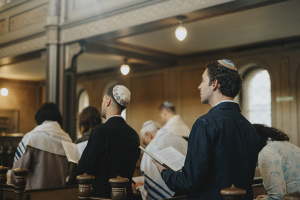The formula for church sex scandals

This week will mark the 14th anniversary of the 30-minute seizure that almost killed my son. It was the most horrifying day of my life. I don’t even like to talk about it because it was so traumatic. I watched my beautiful baby turn blue on the way to the hospital as the medics injected him with Diazapam, praying against hope it would still the convulsions. When I asked the EMT if he was going to make it, he looked at me somberly and said, “I don’t know.”
The Lord saved my boy’s life. He’s not a baby anymore. He’s 15 and the size of a grown man. But not a day has gone by in the last 14 years where I haven’t taken careful, fastidious steps to prevent future episodes. For over a decade, he was on a cocktail of four different prescription medications, none of which ran out at the same time. I am on a first-name basis with most of the local pharmacists. Neurology visits, debilitating OCD episodes, countless prayer sessions, overnight EEGs, bloodwork, and did I mention prayer? So much prayer went into keeping my boy from having another episode.
The trauma of the initial injury has left lasting imprints on the way I navigate my daily life. As a survivor of sexual trauma, I was already living in a state of perpetual hypervigilance before all this happened. But now, it’s on another level and one I’ve learned to cope with as best I can.
When you care about vulnerable people, you bite the bullet and do everything within your power to prevent future injuries. You study the patterns. You recognize the signs. You mitigate the risks. It’s no longer about you or your comfort. Indifference and ignorance are not luxuries you can afford. You become a subject matter expert because you know it’s a matter of literal life or death.
Well, it’s the same (or at least it should be) when it comes to the church’s relationship with sexual abuse.
Sexual trauma can ruin people. I’ve seen it. I’ve lived it. By the grace of God, I’ve survived it. Churches need to be places that offer solutions for the myriad of injuries in the world. We need to be able to point people toward healing and restoration. We cannot do that if we don’t even understand their wounds. If every time we are confronted by them, we are caught off guard and ill-equipped to administer care. In a broken, porn-sick world where sexual trauma is the rule, not the exception, it is imperative for churches that care to thoroughly understand the nature and power dynamics of sexual abuse.
We’ve seen too much to sit this one out. We know that sexual trauma wreaks havoc on the psyche and on people’s ability to trust in a good and loving God. According to the CDC, we know that “over half of women and almost 1 in 3 men have experienced sexual violence involving physical contact during their lifetimes. One in 4 women and about 1 in 26 men have experienced completed or attempted rape. About 1 in 9 men were made to penetrate someone during his lifetime. Additionally, 1 in 3 women and about 1 in 9 men experienced sexual harassment in a public place.”
If this many people came to us with cancer diagnoses, we would likely declare a national health crisis and do everything within our power to identify the cause, recognize the patterns, and find a solution or at least a prevention and treatment plan. But when it comes to sexual abuse, too much of the Church remains largely inept. We should be leading the culture in modeling wisdom and justice in response to this stuff. Instead, we’re perpetually about a hundred steps behind the 8 ball. We wait for the culture to lead the way, and when they finally shout, “Me too!”, half of us resent the invitation to care about the cause we should have championed ourselves. The question is why.
It’s bad enough when so many people come limping into our churches with injuries inflicted outside our walls. But to our shame, not a week goes by without yet another headline about some faith leader caught in a sexual scandal. Not only are we failing to bind wounds, but too often, we are the ones actively inflicting them. What do you think this does to the victims’ perception of God? This isn’t happening just once or twice. It’s a regular occurrence. So why aren’t more of us wising up a lot faster?
What’s frustrating is that the patterns are almost always the same, but for whatever reason, we cannot seem to learn from them. No one seems to have noticed the red flags. Everyone seems shellshocked and horrified by the possibility that whatever man of God they were trusting as their leader could ever deceive anyone, and they go to dramatic lengths to protect their denialism. They minimize the significance, silence the victim, and pretend like nothing ever happened.
I have seen this play out time and time and time again. I actually blogged about this a few years ago. Well, the conversation has been freshly resurrected by the scandal involving Mike Bickle at IHOPKC, who groomed a 19-year-old intern when he was 42 and married, at one point even telling her that God gave him a vision that his wife would die, freeing him up to marry the intern. When you do the work of leafing through the mountains of evidence, it’s pretty damning. This is a deeply dishonest and manipulative man who’s successfully puppeteered countless good-hearted people in order to build his own empire. There are additional allegations that substantiate the claims made against him. Respected IHOPKC leaders closest to the situation somberly penned a letter calling for accountability.
But no one wants to believe it, so the denial game begins, complete with expensive PR teams to whitewash and rewrite the historical record and cast aspersions on those who invite accountability. (P.S., if your church hires a PR firm to strategically preserve its image amid abuse allegations, there’s trouble in paradise.)
This morning I read an article citing Charisma Editor Stephen Strang’s counsel meant to guide the response to the IHOPKC Mike Bickle scandal, and it made me shake my head in dismay. In my opinion, it was something of a masterclass on how NOT to respond. His advice was well-intended. It sounds very Christian-y, full of invitations to grace and restoration. But restoration should not be offered in advance of complete repentance. As my therapist (an expert on sexual trauma) often says, “The work of restoration cannot truly begin until a problem has been fully faced.”
This problem has not been fully faced. It has been whitewashed. Strang’s remarks are full of distancing language: “Past sins,” “many years ago,” etc. Additionally, he frames the conflict as a nasty church split wherein both sides of the equation are behaving poorly and have egg on their faces. But this is not, in fact, a situation where both parties are to blame. This is a situation where Mike Bickle is to blame, where he has not fully confessed the extent of his sin, where he continues to spurn necessary accountability, and where he’s content to allow people to believe that he’s the victim of a witch hunt rather than a predator who abused his spiritual authority in a way that devastated thousands of people who trusted his leadership.
To offer restoration without complete repentance is to offer cheap grace. It’s a choice to circumvent the very process that would bring healing. It’s like trying to treat cancer by stopping chemotherapy after the first round. It is no act of mercy. The wound must be thoroughly cleaned out before you can bandage it.
And let’s talk about restoration. Certain sins disqualify people from pastoral ministry, where the baseline requirement is “above reproach.” These types of sins are among them. Pastors that sin this way may very well be restored to community with the body of Christ, but that doesn’t mean they should be restored to the pulpit.
In our eagerness to clean up the mess, we must be sure we aren’t just sweeping it under the carpet.
What’s frustrating to me about the IHOPKC saga is that the response follows the exact same formula as so many other church sexcapades. Here’s what happens almost every time some respected faith leader is caught in a sexual scandal:
The leader denies (or severely minimizes) the offense.
The leader’s fan club shames and silences the victim, usually playing a massive game of character assassination framing the victim as a divisive Jezebelian harlot.
The leader’s church or ministry hires a marketing company to do damage control.
The leader’s church conducts an internal investigation, too often facilitated by people eager to dismiss the victim. They scoff at invitations to hire a third-party investigator. Another red flag.
Even compelling evidence gets swept under the carpet, whitewashed, or categorized as an “inappropriate relationship” instead of assault, workplace harassment, or rape
The congregation is invited to believe the accusations against the leader are a spiritual or political attack on a powerful man of God whose important work threatens the kingdom of darkness.
If any concrete evidence of impropriety emerges, it is whitewashed and minimized while the leader takes a break for a few months to regroup before quietly re-emerging and stepping back into the driver’s seat as though nothing had ever happened.
Other respected faith leaders step up to the plate to encourage “restoration” and forgiveness without ever insisting on thorough, unfiltered repentance or ownership of sin. Any tepid garden variety apology will do.
Over and over and over again. This is the formula. Not only does it keep happening, but we also keep being surprised by it, caught with our proverbial pants down with seemingly no clue about what a wise response entails.
What’s fascinating to me is that one of the most popular questions people like to ask when allegations of misconduct emerge is, “Why did she take so long to speak?” But watch the public discourse on any thread on social media related to the allegation, and the answer becomes immediately obvious: It’s because she will be disbelieved, slandered, shamed, called names, threatened, and shunned. Speaking will potentially ruin her life and her reputation. Why in God’s green earth might that be worth it to her?
Ravi Zacharias, Jim Bakker, Jimmy Swaggart, Douglas Goodman, Carl Lentz, Mark Darling, Joe Barron, Jordan Baird, Les Hughey, Geronimo Aguilar, Caleb Treat, Dean Curry, Ted Haggard, Paul Pressler, Roy Moore, Earl Paulk, Coy Privette, Tony Alamo, Mike Bickle … Just how many highly charismatic type pastors need to get caught in sexual indiscretions before we wake up to the reality that Christian guys with this kind of influence are uniquely vulnerable to sexual sin? If Satan can take down the leader, why would he not do everything within his power to try? Not even King David, the man after God’s own heart, was exempt.
What absolute foolishness to believe our favorite faith leaders are above this temptation!
Church, if we care about people, we will learn to care enough about the devastation wrought by sexual scandals in our midst to do better. We will learn to recognize the systems and power structures predators hide behind. We will learn to silence our knee-jerk inclination to choose the path of denialism and, instead, insist on a thorough, objective third-party investigation that roots out the truth, however unpleasant. We will implement abuse prevention strategies to safeguard both church members and leaders before a problem can even emerge in the first place.
We have reached a time in our culture where we forfeit any right to claim ignorance on these matters. A church that cares about its people is a church that is vigilant and intentional about protecting them from sexual harm both inside and outside its walls.
Kaeley Harms, co-founder of Hands Across the Aisle Women’s Coalition, is a Christian feminist who rarely fits into boxes. She is a truth teller, envelope pusher, Jesus follower, abuse survivor, writer, wife, mom, and lover of words aptly spoken.




























